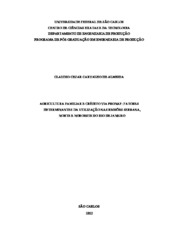Agricultura familiar e crédito via PRONAF: fatores determinantes da utilização nas regiões Serrana, Norte e Noroeste do Rio de Janeiro
Abstract
Family farming is of great importance to the Brazilian economy, due to its participation in food production and its ability to employ labor. Also, in Rio de Janeiro, family farming is highlighted, especially in the Mountain, Northern and Northwest regions. However, throughout Brazil, family farming faces important challenges to fully exploit its potential. The credit is among these challenges.
For family farmers, credit is a vitally important element. With this perspective and aiming to strengthen the granting of credit under conditions consistent with the reality of family farming, the federal government created in 1996 the National Program for Family Agriculture (PRONAF). This program has played an important role in providing credit for family farmers throughout Brazil. In eight months of the 2021/2022 harvest, 1,274 thousand rural credit contracts were financed, corresponding to an amount of R$ 188.4 billion (BRASIL, 2022). However, in some regions it is less used than in others. In the northeast, for example, only 7.3% of family farmers accessed PRONAF in 2016, while in the southern region this percentage reaches 48.8% (IBGE, 2017). This is the case, for example, of the regions studied in this thesis. Without having the objective of making a comparative study between regions of Brazil, it is important to know which factors can best explain the raising of credit, via PRONAF, by farmers in the Mountain, Northern and Northwest regions of the State of Rio de Janeiro.
Thus, this work has as main objective to identify determining factors of access to rural credit by family farmers located in the Mountain, North and Northwest regions of the State of Rio de Janeiro. To achieve this objective, were used primary data collected through face-to-face interviews in 499 households, distributed in the three regions. These data were analyzed in a logistic linear regression model, built from a set of hypotheses that are based on a conceptual model built with theoretical elements of the Resource-Based View and the Transaction Cost Theory.
The results obtained through the econometric model made it possible to confirm the identification of four factors (marital status of the family farmer, the share of the value of rural production in the total income of the property, the availability of guarantees and access to technical assistance) as determining factors of access to PRONAF credit by family farmers in the state of Rio de Janeiro, in addition to providing subsidies to suggest measures related to rural credit and improvements in the management of properties and production processes of family farmers.
Collections
The following license files are associated with this item:

